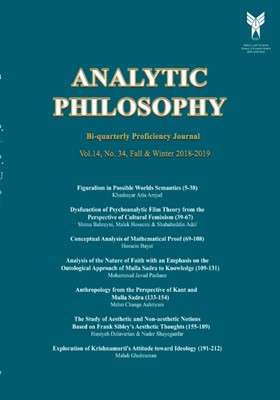Anthropology from the Perspective of Kant and Mulla Sadra
Subject Areas : Philosophy
Keywords: Kant, Mulla Sadra, Anthropology, Didactic, Descriptive, Divine Caliph,
Abstract :
Kant is a great philosopher who, in the context of anthropology, believes that humans do not have a stable identity. In Mulla Sadra's view, man is the only being which does not have a certain nature and his truth would not be his actions; rather the infinite possibilities ahead of him would form his reality. From Kant's point of view, man is not of a steady nature; humans shape their identities through their actions and behaviors, especially in their interaction with others and in the community. Both philosophers have given special attention to creativity and intellectual creation. Kant tried to eliminate the limitations of theoretical reason with the aid of practical reason, thus established the basis of humanistic ethics through discussing the good will which is the most important feature of the realization of humanity. But the philosophical anthropology of Sadr Al-Muta Allihin, in contrast to Kant’s, is based on theoretical theory. The theoretical intellect promotes to the Acquired Intellect by conjunction and union with the Active Intellect. Humans are God’s caliphs having all his divine names and attributes. They have the attributes associated with both tanzih and tashbih. God has bestowed upon them the ability to perceive everything, so that they can recognize all universal and partial truths. Thus, due to the unity of the knower and the known, the rational universe becomes similar to the external world. This is what human integrity and divine caliph mean.
_||_

